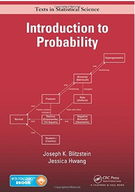In deterministic logic, the statement A implies B is equivalent to its contrapositive
Chapter 2, Problem 17(choose chapter or problem)
In deterministic logic, the statement A implies B is equivalent to its contrapositive, not B implies not A. In this problem we will consider analogous statements in probability, the logic of uncertainty. Let A and B be events with probabilities not equal to 0 or 1. (a) Show that if P(B|A) = 1, then P(Ac|Bc)=1. Hint: Apply Bayes rule and LOTP. (b) Show however that the result in (a) does not hold in general if = is replaced by . In particular, find an example where P(B|A) is very close to 1 but P(Ac|Bc) is very close to 0. Hint: What happens if A and B are independent?
Unfortunately, we don't have that question answered yet. But you can get it answered in just 5 hours by Logging in or Becoming a subscriber.
Becoming a subscriber
Or look for another answer
